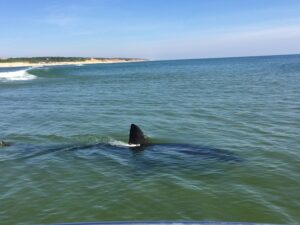WELLFLEET — A group of fishermen using baited hooks delivered by drones to fish for sharks at LeCount Hollow Beach last September got into an altercation with surfers that led to Wellfleet police and Cape Cod National Seashore officers being called — but the fishermen were released without being charged.

That incident inspired the state’s Marine Fisheries Advisory Commission to implement new regulations on March 27 that allow authorities to charge people with shark fishing in areas where great white sharks are the dominant species.
Great white sharks are federally protected, so fishing for them was already illegal. Fishing for other shark species is legal, however, so anyone targeting white sharks “can simply state to the environmental police that they are targeting other species,” said Greg Skomal, Div. of Marine Fisheries Large Pelagics and Diadromous Fisheries Program Manager.
But in the waters around the Outer Cape, few other sharks exist. With that in mind, the DMF aimed for an outright ban on shark fishing from shore on the Outer Cape and in Cape Cod Bay by banning the use of a metal or wire leader longer than 18 inches or a hook with a gape exceeding five-eighths of an inch. This regulation, DMF Fisheries Policy Analyst Jared Silva explained at the March 27 meeting, is “targeted at the more robust gear that’s used to target white sharks.”
The regulations also banned shore-based chumming during the daytime and banned the use of drones and other remote-control devices to drop bait. The southern beaches of the Cape that face Nantucket Sound were not included in the regulations since that area has a historic shark fishery that doesn’t target great whites.
The Marine Fisheries Advisory Commission passed the regulations by a vote of 5-1.
At the meeting, Silva also said that shore-based white shark fishing has been rising in popularity, which he attributed to social media. Massachusetts is the primary location for this activity, he said.
Typically, shark fishermen fish at night on remote beaches, Skomal added. The group of fishermen who used their drone to fish off LeCount Hollow last September 28 did so in the hours just after dawn, which led to the conflict with surfers who said the fishing lines and the use of bait to attract sharks were endangering their lives.
According to Megan Winton, senior scientist with the Atlantic White Shark Conservancy, the LeCount Hollow incident put shark fishing on the state’s radar. “People were sending information our way at the Conservancy asking if we had heard of this,” she said. “They were upset about it.”
At a prior advisory commission meeting on Dec. 17, DMF Director Daniel McKiernan presented the first draft of the regulations and said they were motivated in part by the LeCount Hollow incident and the Independent’s reporting of it.
An Oct. 10, 2024 article about the incident “was really compelling,” McKiernan said. “It talks about the difficulty of having this directed shark fishery taking place amongst surfers.”
Skomal said the regulations would make it much easier to actually police white shark fishing. “Once we’ve defined what shark fishing is, an environmental police officer can now approach somebody and look at their gear and determine, ‘OK, you’re shark fishing,’ ” Skomal said.
Some people might keep fishing anyway, he added. “These adventure anglers who target big sharks for social media clicks, it might be worth it in their minds to try to continue this activity,” he said.
Winton, who was not involved in drafting the regulations, said they would both protect white sharks and improve public safety. “The Outer Cape is such a popular area with both people and white sharks in the summer and fall,” she said, and baiting sharks into the shallows could draw them toward people.
One Fisherman’s Response
There were three anglers involved in the LeCount Hollow incident: Alexander Whittet of Harwich, Sean Willis, and Brennus Parks, a founder of JP Fishing LLC, a shark-fishing outfit based in Maryland.
Parks declined to comment on the new regulations, but Whittet responded to inquiries sent through a messaging app.
Whittet said the new regulations were taking away fishermen’s rights, and that other shark species do occasionally appear in the waters around Cape Cod. He pointed to news stories of thresher and porbeagle sharks washing ashore on the Outer Cape and sand tiger sharks gathering in Duxbury Bay. Whittet claimed that when he fished from Outer Cape beaches he was targeting those species.
Skomal told the Independent last fall that it is incredibly rare to find any sharks other than great whites near shore. “In 37 years of working on sharks in this state, I can say that I have only encountered white sharks in the shallows along the Outer Cape,” he said last October.
The regulations also do not ban fishing for smaller sharks if fishermen use smaller gear. Whittet said he uses the heavier gear outlined in the regulation to “reduce the fight time” on smaller sharks, which he said gives them a better chance at survival.
Whittet has posted numerous videos on Instagram of himself and people with him reeling white sharks in to shore. He told the Independent that all of his white shark catches have been accidental.
He also said that he and some other fishermen will probably avoid the Outer Cape because of the new regulations. “It’s not worth the risk, knowing you could get fined,” he said.



